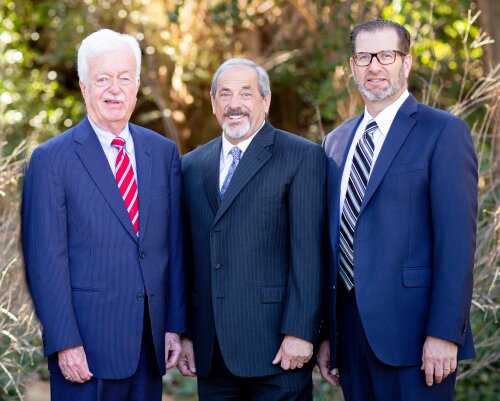Best Adoption Lawyers in California
Share your needs with us, get contacted by law firms.
Free. Takes 2 min.
Free Guide to Hiring a Family Lawyer
Or refine your search by selecting a city:
List of the best lawyers in California, United States
About Adoption Law in California, United States
Adoption in California is a legal process that establishes a permanent parent-child relationship between individuals who are not biologically related. Once an adoption is finalized, the adoptive parents have all the legal rights and responsibilities of natural parents. California recognizes several types of adoption, including stepparent adoption, agency adoption, independent adoption, international adoption, and adult adoption. The main goal is always the best interest of the child, ensuring stability, safety, and permanent family connections.
Why You May Need a Lawyer
While some adoptions can proceed smoothly, many situations arise where legal guidance is crucial. A lawyer can help navigate complex legal procedures and paperwork, ensure compliance with state requirements, and protect the interests of all parties involved. You may need a lawyer if you encounter contested adoptions, difficulties with consent, issues related to parental rights termination, complicated family dynamics, interstate or international adoptions, or simply if you want reassurance that you are completing the process correctly. Legal representation is also helpful if there are allegations of fraud, concerns about the child's well-being, or involvement with Child Protective Services.
Local Laws Overview
California has specific laws that govern adoption to ensure protection for children and families. A birth parent's consent is usually required unless parental rights have been terminated due to abuse, neglect, or abandonment. There are different rules for stepparent, agency, independent, and international adoptions. Background checks, home studies, and sometimes court appearances are part of the process. Adoptive parents must meet particular eligibility requirements, and the law requires a waiting period before the adoption is finalized in most cases. Confidentiality is also a significant aspect, with records generally sealed after the adoption is complete. Financial exchanges related to the adoption process are regulated to prevent coercion or unethical conduct.
Frequently Asked Questions
What are the different types of adoptions in California?
California recognizes agency adoptions, independent adoptions, stepparent adoptions, adult adoptions, and international adoptions. Each has different legal processes and requirements.
Do both birth parents have to consent to the adoption?
Generally, yes, unless one parent's rights have been terminated for reasons such as abandonment, neglect, or inability to locate the parent despite diligent search efforts.
What is a home study and is it required?
A home study is an assessment of the adoptive family's home and background. It is mandatory for most adoptions, except certain relative or stepparent adoptions.
Are adoption records confidential in California?
Yes, adoption records are sealed by the court. Adult adoptees may request access under specific circumstances, but records generally remain confidential.
How long does the adoption process take?
The timeline varies. Some adoptions, like stepparent adoptions, may take several months, while agency or international adoptions can take a year or longer.
Can unmarried individuals adopt a child in California?
Yes, both single adults and married couples can adopt in California. Marital status is not a barrier, but applicants must meet general eligibility requirements.
What financial assistance is available for adoptive families?
There are state and federal tax credits, subsidies for adopting children from foster care, and some nonprofit organizations offer grants or low-cost services.
What is the difference between open and closed adoption?
Open adoption allows some form of contact or exchange of information between adoptive and birth families, while closed adoption means no contact or identifying information is shared.
What are the requirements for adopting a child from foster care?
Prospective parents must complete an orientation, training, a background check, and a home study. Additional requirements may apply based on the child's needs.
Do I need an attorney to adopt in California?
While not legally required for every case, having a lawyer ensures all legal steps are correctly followed, protects your rights, and helps resolve any complications.
Additional Resources
- California Department of Social Services - Adoptions Branch: Provides information about the adoption process, requirements, and forms for prospective parents.
- County Adoption Agencies: Local public agencies that offer adoption services, support, and information based on your place of residence.
- California Courts Self-Help: Offers guidance, forms, and legal resources for individuals navigating adoption without an attorney.
- Child Welfare Information Gateway: National resource with adoption laws, publications, and advice for adoptive families.
- Legal Aid Organizations: Nonprofits such as Public Counsel or Legal Aid Foundation of Los Angeles can provide legal consultation and sometimes representation at low or no cost.
Next Steps
If you are considering adoption in California, start by researching the type of adoption that matches your situation. Gather necessary documents, educate yourself about the requirements, and schedule a consultation with a licensed adoption attorney or local adoption agency. An attorney can help clarify your rights, guide you through each step, and identify any potential obstacles early on. If cost is a concern, explore local legal aid organizations. Each adoption journey is unique, and taking these initial steps ensures you are informed and ready to provide a loving, legal home for a child.
Lawzana helps you find the best lawyers and law firms in California through a curated and pre-screened list of qualified legal professionals. Our platform offers rankings and detailed profiles of attorneys and law firms, allowing you to compare based on practice areas, including Adoption, experience, and client feedback.
Each profile includes a description of the firm's areas of practice, client reviews, team members and partners, year of establishment, spoken languages, office locations, contact information, social media presence, and any published articles or resources. Most firms on our platform speak English and are experienced in both local and international legal matters.
Get a quote from top-rated law firms in California, United States — quickly, securely, and without unnecessary hassle.
Disclaimer:
The information provided on this page is for general informational purposes only and does not constitute legal advice. While we strive to ensure the accuracy and relevance of the content, legal information may change over time, and interpretations of the law can vary. You should always consult with a qualified legal professional for advice specific to your situation.
We disclaim all liability for actions taken or not taken based on the content of this page. If you believe any information is incorrect or outdated, please contact us, and we will review and update it where appropriate.
Browse adoption law firms by city in California
Refine your search by selecting a city.















